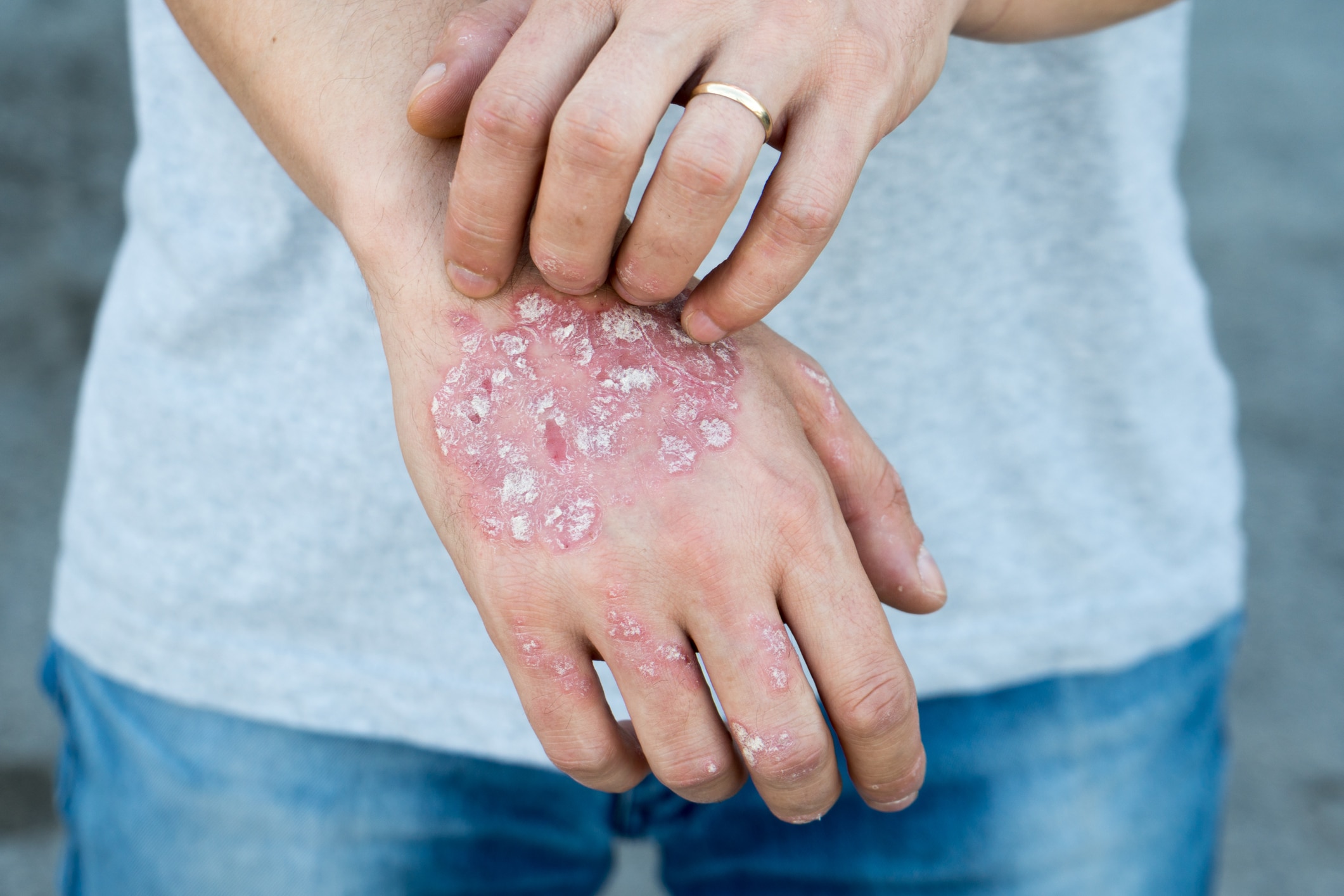Psoriasis Treatment & Clinical Trials for Psoriasis in South Florida

What Is Psoriasis?
Psoriasis is an autoimmune skin condition that causes skin cells to grow faster than usual, leading to the accumulation of dead skin cells on the outer layer of your skin. The excess skin cells cause flaky, and sometimes itchy, red patches to appear on your skin. There are various types of psoriasis, including:
- Plaque psoriasis
- Guttate psoriasis
- Scalp psoriasis
- Inverse psoriasis
- Nail psoriasis
- Pustular psoriasis
- Erythrodermic psoriasis
What Causes Psoriasis?
The cause of psoriasis is not yet fully understood. However, it is believed to be caused by a glitch in the immune system. Under normal circumstances, T cells (a type of white blood cell within your immune system) can help fight off harmful invaders. With psoriasis, T cells may mistakenly attack your healthy skin cells. T cells may also be one of the reasons why new skin cells grow and produce at a higher than normal rate.
You may be at a higher risk of developing psoriasis if you:
- Have a parent who has psoriasis
- Have a viral or bacterial infection
- Are under high levels of stress
- Are overweight
- Are a smoker
Psoriasis symptoms may also develop or intensify with certain triggers, such as:
- Certain infections
- Injuries to the skin, including minor cuts or scrapes, sunburns, or bug bites
- High consumption of alcohol
- Lack of vitamin D
- Certain medications
What Are the Symptoms of Psoriasis?
Psoriasis symptoms can affect any part of your body from your head down to your feet, but symptoms most commonly occur on the lower back, elbows, knees, and scalp. Symptoms vary from person to person, but in general, the symptoms of psoriasis include:
- Red, flaky patches of skin
- Dry skin that may or may not bleed
- Affected areas that feel itchy, hot, or sore
- Eroded nails
- Thickened nails
- Swollen and stiff joints
How Is Psoriasis Diagnosed?
To make a diagnosis, your doctor will examine your skin for symptoms of psoriasis. Your doctor may also ask you to describe any symptoms that you have been experiencing. Additional testing, such as a skin biopsy, may be needed to ensure that there are no other underlying conditions that may be causing your symptoms.
Can Psoriasis Lead to Complications if Left Untreated?
Left untreated, psoriasis may put you at a higher risk for developing other diseases, such as:
- Psoriatic arthritis
- Obesity
- Certain eye conditions
- Type 2 diabetes
- Cardiovascular disease
- High blood pressure
- Other autoimmune diseases
- Kidney disease
- Metabolic syndrome
- Parkinson’s disease
Who is a Candidate for Psoriasis Treatments?
If you have psoriasis, you are a candidate for treatment. This chronic autoimmune condition can be addressed in several different ways. Your doctor's objective is to discern which treatment or combination of treatments will be most appropriate for you. A thorough consultation, medical history review, and dermatologic exam will be performed to accurately identify the severity of your psoriasis and to guide the treatment planning process.
What Psoriasis Treatment Options Are Available?
While there is no cure for psoriasis, there are certain treatment options that can help alleviate your symptoms. Treatment options for psoriasis may include:
- Certain topical treatments
- Skin moisturizers or creams
- Exposing the skin to natural or artificial UV light
- Certain oral medications
- Certain injectable medications
- Certain diets, supplements, or herbs
- Daily bathing to help remove the excess skin
- Avoiding psoriasis triggers
For some patients, a clinical trial for psoriasis may be another treatment option to consider if other therapies fail to produce successful results.
What Are the Side Effects of Psoriasis Treatments?
Some psoriasis treatments, especially systemic medications, can cause side effects like nausea and diarrhea. Generally, a doctor will use the most conservative therapies to attempt to bring psoriasis under control. For example, your doctor may prescribe a topical medication or light therapy to reduce your symptoms. These therapies may cause minor skin irritation and they may cause increased photosensitivity, so you would be advised to avoid excessive sun exposure. When you consult with your dermatologist about psoriasis treatment, you can expect to be fully informed about expectations, potential risks, side effects, duration of use, and more.
Are Psoriasis Treatment Results Permanent?
Unfortunately, psoriasis treatment is not a once-and-done event. This systemic condition tends to come and go without any warning. Flare-ups may be brought on by a variety of triggers. The role of your dermatologic care is to help you keep your psoriasis flare-ups under control as much as possible. As you can imagine, this is an ongoing process that will involve periodic appointments with your doctor. Additionally, you will follow a treatment plan as needed when flare-ups do occur and learn what triggers them so you can make lifestyle choices accordingly.
Are Psoriasis Treatments Painful?
Psoriasis itself can be a painful and distracting condition. The treatments that are performed to stop the accelerated growth of skin cells and aid in proper cellular turnover may be mildly uncomfortable, depending on the therapy you need. That said, treatments are not usually described as painful. On the contrary, because psoriasis treatment brings the inflamed skin under control, we usually expect symptoms to improve quite a bit through the course of the treatment program.
Are Psoriasis Treatments Covered by Insurance?
Health insurance policies can vary significantly in their coverage details. This can make it tricky to receive the level of care that you need to manage your psoriasis. In recent years, some of the most effective treatments for severe psoriasis, biologics, have become increasingly regulated. As a result, some insurance companies may now require prior authorization for this type of treatment. Your insurance may ask that you provide documentation proving that you have tried conservative treatments without improvement before they will consider covering more comprehensive treatments. The best approach to getting your psoriasis treated is to contact your insurance provider directly and request written information that outlines your policy coverage amounts.
Does Psoriasis Worsen with Age?
Typically, psoriasis does not get worse with age. This skin condition is most directly affected by environmental factors such as heat and humidity. Flare-ups have also been linked to obesity and stress. Most of the factors that can trigger a psoriasis flare-up can be controlled to some degree. Understanding your triggers enables you to gain some control over your dermatologic health and comfort.
Schedule A Consultation
If you have been unsuccessful in finding the right treatment option for your psoriasis sign up for a future clinical trial today. With over 25 years of experience in the execution of dermatological clinical trials, our team is highly trained and committed to ensuring that all clinical guidelines are met and that the rights of every patient are always protected. Call 561-948-3116 or fill out the form on this page to learn more about our clinical trial options.
